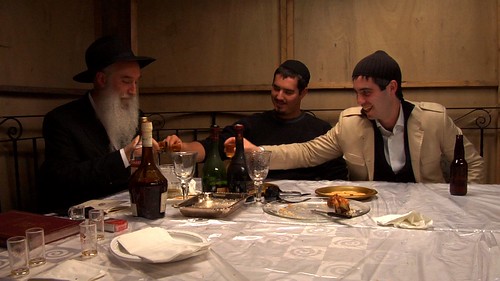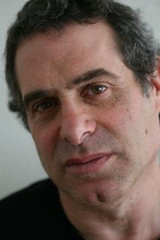The other day I went to see an excellent documentary directed by Eric Scott and produced by my friend Frederic Bohbot and Evan Beloff of Bunbury Films, here in Montreal. The film is called ‘Leaving the Fold’ and it’s about young people who have left their Orthodox jewish families and culture to live an ordinary life.
It is still playing at the Park Cinema in Montreal, and will be shown on Radio-Canada later in the season. ( It was turned down by the CBC, hard to understand !)
I was very impressed with the choice of characters, and with the access to the normally very closed Hasidic milieu. One of the things you learn is that life among the Hasidim is strictly regulated and controlled, and the rebellion of those who decide to leave the fold seems totally comprehensible. But of course they have grown up with those very strong values and strictures, and will never be able to completely leave them behind.
As a result, they are ‘free’ but still conflicted individuals. The way they open up and share their thoughts and feelings is very touching.
The most fascinating scenes are with a father, Pincus Riven, and his two sons Hudi and Levi who have left the fold. They all speak very honestly and emotionally. We follow the father to prayer sessions and ceremonies where his deep concern and sorrow for his ‘lost’ sons is clearly in evidence. But then, in a surprising twist which ends the film, we find them eating and drinking together and discussing their differences with a considerable amount of compassion and mutual understanding.
I put a few questions to Eric.
How did you get access ? Was it possible because you were dealing with Lubavitch orthodox jews who are known to be relatively more open to the world ?
Although Pinchus Riven is a member of the most “open” Lubavitch Hasidic sect, that alone was not sufficient grounds to give me access. In my mind the more determining factor is that Pinchhus is a ‘baal tshuva’, someone who has repented, in other words become hasidic. He is familiar enough with “outside” culture so as not to be afraid of it. In the course of my research I met other ex-Lubavitch kids who came from “old line” Lubavitch families and the stories were as shocking as those of kids coming from more “closed” Hasidic sects. In those cases there was no question of the parents ever considering participation in a documentary.
The father and sons, in spite of their differences and the father’s sadness, they seem to have a very warm relationship – is this surprising to you, as someone who knows the community ?
The Riven boys do have a surprisingly warm relationship with their father, considering the gravity of their decision and its impact upon the family and its status in the community. Often the arranged marriage negotiations of younger siblings are put into jeopardy because a family would be considered “tainted” if another child has chosen to leave the fold.
The father thinks he did something wrong… is it possible that the reason two of his sons left was instead that he had some special quality, openness, curiosity… that he passed on ?
In the case if the Riven family, the reason that the boys left came more from their personal dissatisfaction with Hasidic life than from their father’s openness or curiosity. After all, they have 6 other siblings who have stayed firmly in the fold. The boys’ two religious brothers (the eldest and youngest of the four) are no less intellectually gifted or curious than Hudi or Levi.


En litterature, y a un roman absolument fantastique, qui accroche de la premiere a la derniere page, qui s’appelle My name is Asher Lev, de Chaim Potok.